LET’S TALK ABOUT POLITICS
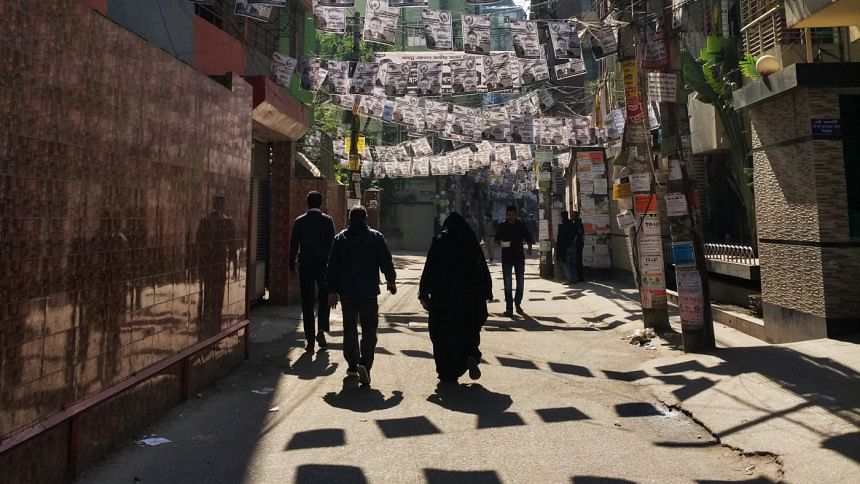
As a child, when you were being taught manners, you might have been told to avoid a certain topic during conversations. Politics. If you went to dinner parties that ultimately culminated in middle-aged men engaging in shouting matches while discussing you-know-what and you-know-them, it might have seemed like sound advice.
However, that is unfortunate for more reasons than one.
Many people are discouraged by their families to speak about or be interested in politics from a young age. Twenty-four year old Shaila Zaman says, "We were told not to discuss politics with anyone and were made to believe politics was something that is scary and confusing and its best for us if we stayed out of it. As a result, I never tried to understand it and was rather quick to dismiss it."
For Afnan Rahman, from North South University, indifference for politics stemmed from elsewhere. "I have never been discouraged by my family in anything that has kindled interest in me. I am fortunate in that way. Rather I've seen documentaries and movies based on politics. The intertwined corruption that dismantles a whole state is what brought out my apathy towards politics."
Asked which political figures have done a great job in their eyes, Afnan says, "From our generation, I do not see anyone remarkable in this field. However, if someone makes a contribution in sports or climate change and disaster management, I always appreciate them." In contrast, Shaila is a bit more pessimistic, "Frankly I don't keep up with everyday politics that way for me to be able to name someone. And this is because of the lack of hope I have in the system to begin with."
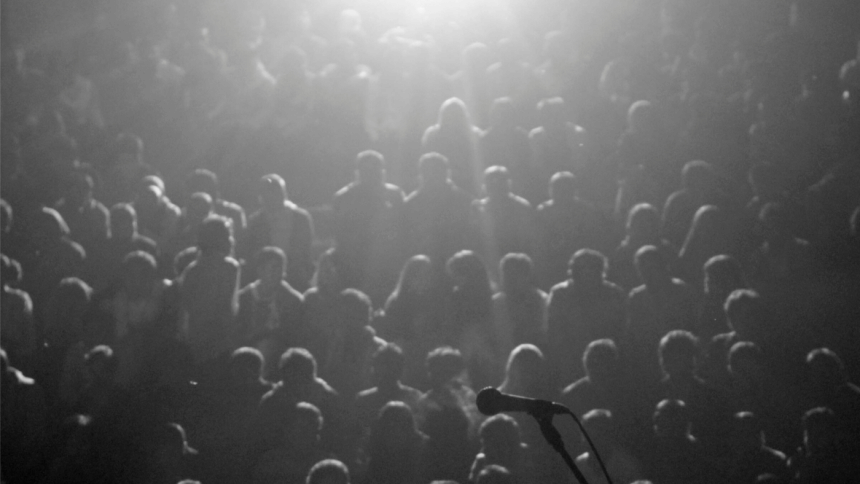
The Age of Information
It won't be a stretch to say we are the most informed generation in the history of humankind. A cursory glance at charts showing just how much content is produced and consumed per second can tell astounding results. This, however, can also mean we are the most misinformed people ever. Just the amount of false information spreading on multiple platforms from the onset of the Covid-19 pandemic tells us how much misinformation is peddled on the internet, and how it influences the behaviours and decisions of people who may not fully be aware of how to make sense of what they come across.
In addition, the internet has enabled almost anyone to publish what they want, free of cost and with little-to-no supervision. Not only does this mean we need to be careful about what information we believe in, it means that we have a role to play in understanding events and disseminating information.
You might feel that having knowledge of politics isn't relevant to you, you're not a member of a marginalised community, you've been fine not knowing about political matters so far, or you're convinced that knowing won't help you bring about change so there's no point in knowing anyway, right?
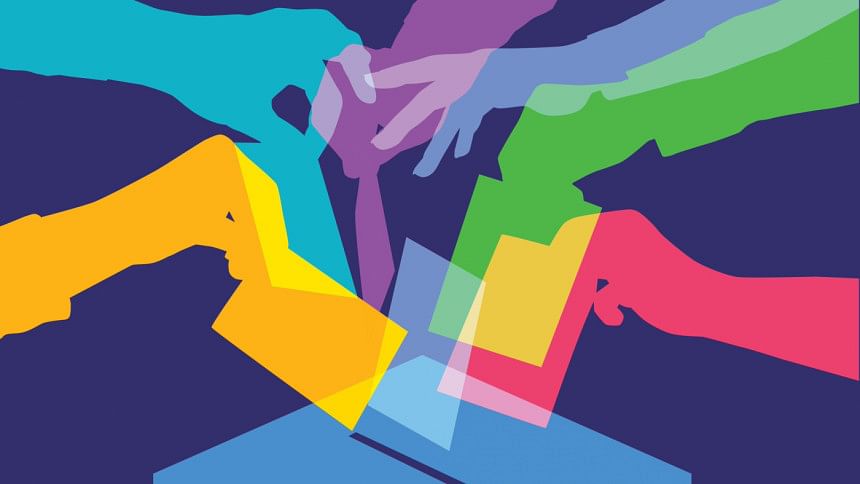
But take a moment to think this through. Even if you're not concerned about hot button issues like taxes, unemployment, and other such matters, politics still affects you—and politics can be personal. Right from where you live to what you eat to the number of board exams you have to take in school to even the quality of the air you breathe in is impacted by politics, and being in denial of that is dangerous both for you and others surrounding you. Being politically aware enables you to shape the opinions of people in your vicinity, even if it is done unconsciously, for people are affected by what others in their social circle do. This is important, because when it comes to politics, you have to live with not only your own choices but the choices of others. History is filled with examples of protests and uprisings that upended the systems that existed then and brought about change that massively impacted the lives of the masses.
Tashrifa Fairuz Raiza, a student of the University of Dhaka (DU) says, "Politics came along with my birth rights. However, my family never tried to feed me their points of view, but rather encouraged me to choose my own. Whether I wanted to have an active participation or not was always my choice to make. I would say it was actually because of them that political research intrigued me. Moreover, now considering that I am doing my major from DU, this catalysed my eagerness about politics further."
Often, and especially at a young age, simply obtaining and spreading knowledge can have a massive impact. To see an example of this, we can look at the effect that television host and political commentator John Oliver has had on policies and politicians. From helping the Society of Women Engineers receive USD 25,000 in donation a mere two days after the airing an episode (this amount is 15 percent of the donations they usually receive each year from individuals) to influencing a Washington state legislator to launch a new initiative that allowed people to comment on new legislation through videos uploaded online, Oliver has repeatedly managed to not only inform citizens of what is happening but also informed them on how they can take action. Democracy, remember?
The Importance of Education
Discussions on the redundancy of a lot of what is taught in school have been going on for years, and demanding change in the education system is something we could still be doing. However, we have to acknowledge that before the change comes, it is up to us to learn ourselves.
We live at a time when we can obtain information not only through reading but also through media like podcasts, documentaries, and YouTube videos. Many of these tackle complex issues that might have been tedious for some to read about and also difficult to understand. Millennials make up the largest demographic in viewership for shows like Last Week Tonight and The Daily Show comprising 41 percent and 36 percent of total viewership respectively, which only shows young people do care about the issues surrounding them.
Asked about the importance of being informed, Afnan says "Politics is concerned with governing the country for its betterment. So we cannot be misinformed or ignorant about it. If so, it would lead to choosing a wrong representative for the nation which might be devastating."
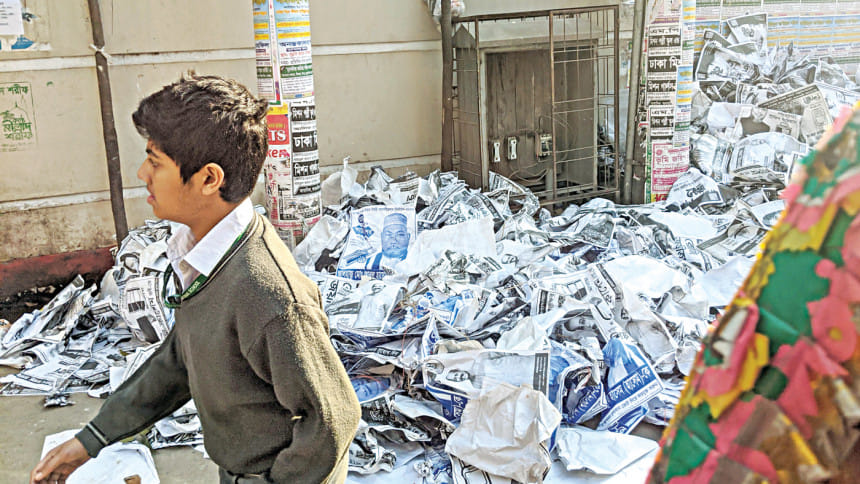
"There are people who choose to be involved more into education than investing time in politics, and vice versa," opines Tashrifa Fairuz. "What I believe is that no one should be shamed for choosing what they want. However, someone who chooses education doesn't necessarily have to play an active part in politics. However, they can do their part of education through research to be aware about politics.
It is important to be politically aware because as a citizen you need to know whether you are born in an independent country or not, whether it is politically free or not, and especially how it runs, for instance whether it is a diplomatic country, a socialist or federal one and so on. Not being politically aware means you are not aware of your own birth rights which the country offers, also of the rights you have as a human. It is very easy to exploit someone who is not politically aware. However, it is necessarily not the case that political unawareness will lead to one's own exploitation, but the chances are high. Being informed will not only be beneficial for themselves, but their surroundings too."
In Conclusion
It is far too easy to be cynical and not take steps to make a better society. The reality is that we are observed and our collective opinions, when loud enough, do reach the ears of people in positions of authority. Even if systemic change and concrete actions aren't brought about, they do let authorities know what the people expect and what they are not willing to tolerate. Greta Thunberg and her climate activism is an inspiring example of this.
At a time when we are constantly bombarded with information about what is happening across the world, it is understandable that people might be emotionally exhausted, fed up, and agitated at the state of affairs. We know change takes time but we also know that crucial moments of action can serve as catalysts for change.
In the meantime, the least we can do is become more politically aware, so that when the time does arrive, we have the ability to make the right decision.
Aliza is Matilda resurrected. Reach her at [email protected]; Mrittika Anan Rahman is a daydreamer trying hard not to run into things while walking. Find her at [email protected]
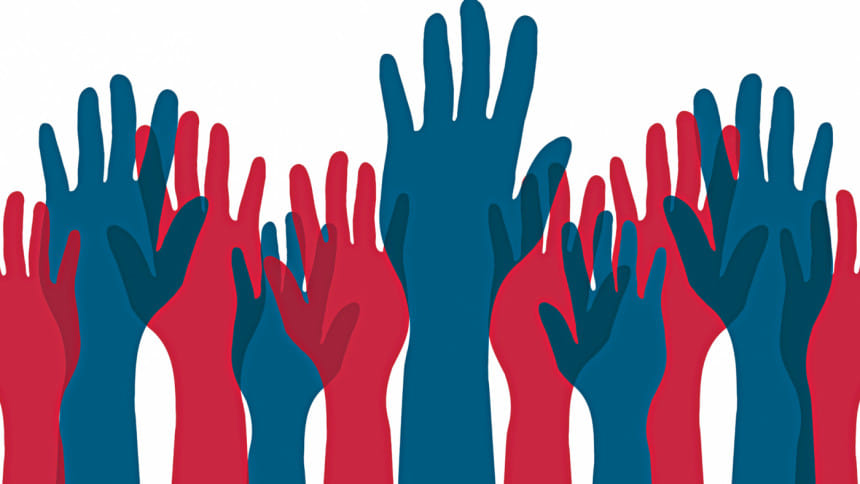

 For all latest news, follow The Daily Star's Google News channel.
For all latest news, follow The Daily Star's Google News channel. 



Comments